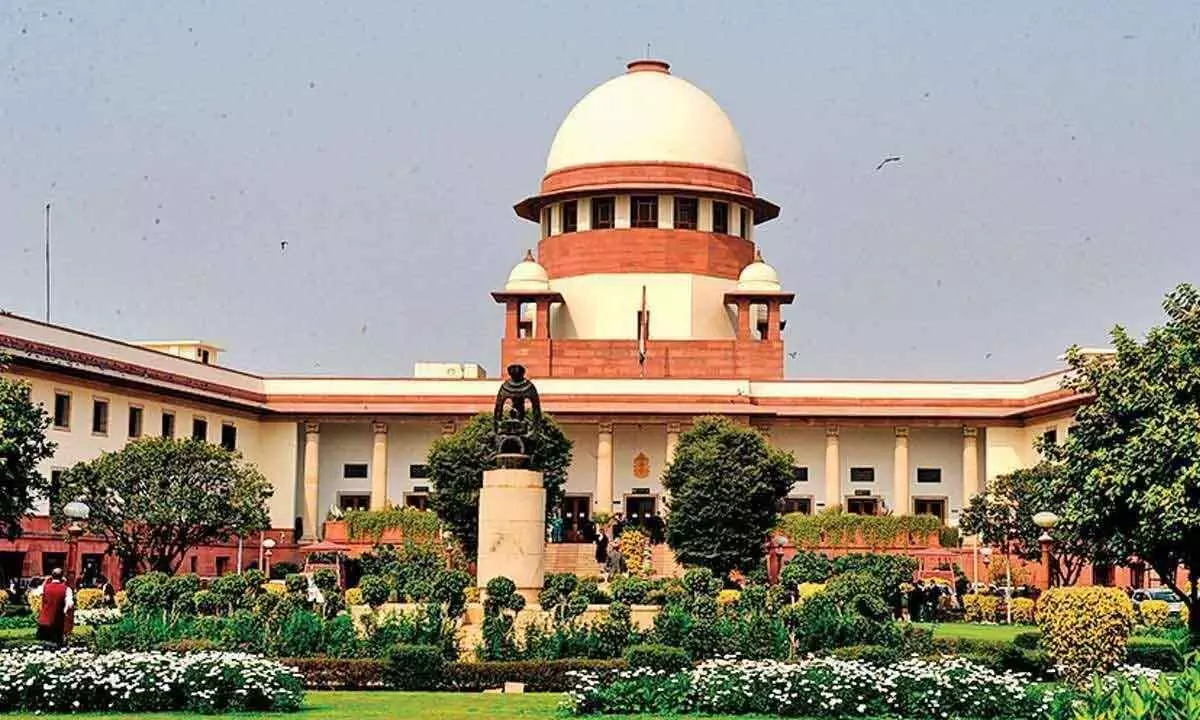Live
- Mohan Babu’s attack on journalists inhumane act
- West Quay-6 of VPA to get revamped
- Rajaiah demands govt to introduce SC categorisation Bill in Assembly
- Make all arrangements for smooth conduct of Group-2 exams
- CP congratulates chess champs
- Stage set for children’s science exhibition
- ‘Generation Green’ initiative to drive e-waste awareness
- Mysore royal family to get Rs 3,000 crore compensation for Palace Grounds
- Suspend officers who caned Panchamasali protesters: Bommai
- Unique move by student reaches over 1,500 in 8 countries
Just In
In countries like Iran, women are fighting against hijab, Karnataka govt to Supreme Court


Supreme Court of India
Solicitor General Tushar Mehta, representing the Karnataka government, on Tuesday told the Supreme Court that even countries like Iran, which are constitutionally Islamic, women are fighting against hijab.
New Delhi: Solicitor General Tushar Mehta, representing the Karnataka government, on Tuesday told the Supreme Court that even countries like Iran, which are constitutionally Islamic, women are fighting against hijab.
Mehta submitted before a bench of Justices Hemant Gupta and Sudhanshu Dhulia that the purpose of uniform, is for equality, equity, and uniformity and when one has to cross that threshold, then that person's test has to be higher.
He said India is a secular country and even in countries which are constitutionally Islamic like Iran, not all women are wearing hijab, instead they are fighting against it. He added that its mention in the Quran "means it's permissible.. Not essential".
Mehta also queried if is it so compelling that people who do not adhere to it are excommunicated or they cannot think of their existence without it?
At this, Justice Dhulia said they (the petitioners) are saying we'll wear uniforms and they are not saying we won't. He queried Mehta that if a child wears a muffler during winters, even the muffler is not prescribed in the uniform and will it be prevented?
Mehta said the rule says there cannot be a religious identity and uniform is uniform, and in a secular school, one has to wear the uniform.
Justice Gupta then asked Mehta if a leather belt is part of the uniform and someone says that we can't wear leather, will it be allowed?
Mehta said if the uniform says short pants, one cannot wear it so short that it's indecent and everyone understands the uniform and discipline. He added that in some countries, women are not allowed to drive but clarified that he is not criticising any religion.
During the hearing, the apex court said it must be proved beyond doubt that the wearing of the hijab was a threat to public order, public health or morality.
Mehta said the uniform being part of essential discipline in schools was being scrupulously followed, however then a movement started on social media by an organisation called Popular Front of India and the movement was designed to create an agitation.
He added there were messages on social media to begin wearing hijab and this was not a spontaneous act, instead it was a part of larger conspiracy, and children were acting as advised.
Justice Dhulia orally remarked that the Karnataka High Court should have not gone into the essential religious practice test. Mehta agreed that the high court could have avoided going into the essential religious practice issue, however he added that it was the petitioners who moved the court raising the argument that hijab was an essential practice.
The apex court is hearing petitions challenging the Karnataka High Court's judgement of March 15 upholding ban on hijab in pre-university colleges. It is likely to continue hearing the matter on Wednesday.

© 2024 Hyderabad Media House Limited/The Hans India. All rights reserved. Powered by hocalwire.com






